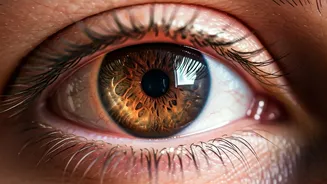Eyes: A Health Mirror
The human eye is more than just a tool for seeing; it is a complex organ that can offer vital clues about your overall health, specifically your cardiovascular
system. During an eye exam, ophthalmologists and optometrists can observe the blood vessels at the back of the eye, including the retina. These vessels are similar to those found throughout the body, including the heart. Therefore, any changes in their condition can provide insights into the health of your heart and blood vessels. When the blood vessels in the retina show signs of damage, it could indicate underlying issues such as high blood pressure, diabetes, or even early-stage heart disease. These issues can manifest in various ways, such as narrowed blood vessels, bleeding, or swelling in the retina. Regular eye exams enable doctors to catch these issues early, offering a crucial window for intervention and preventive care. This connection between the eyes and the heart underscores the significance of comprehensive health check-ups and the value of regular eye examinations.
Spotting Early Warning
Eye exams play a pivotal role in spotting the subtle early warning signs of heart disease, even before noticeable symptoms appear elsewhere. One of the main indicators is the condition of the blood vessels. When the blood vessels in the eye become narrower or show signs of hardening, it can be a sign of atherosclerosis, which is the buildup of plaque in the arteries. This is a primary risk factor for heart disease. Another critical sign is the presence of small hemorrhages or bleeding within the retina. These can indicate high blood pressure, a condition that puts extra strain on the heart and blood vessels. Swelling of the optic nerve can also be a warning sign, potentially indicating the presence of high blood pressure or a stroke. Furthermore, eye doctors can identify cholesterol deposits in the blood vessels, which are another indication of cardiovascular risk. These subtle changes detected during an eye exam can provide valuable information, enabling early intervention, such as lifestyle changes or medical treatment, that could potentially prevent further disease progression.
The Importance of Early Diagnosis
Early diagnosis is crucial in the management of heart disease. The sooner heart problems are identified, the more effective the interventions can be. Early detection through eye exams allows doctors to start treatment before the disease advances and causes more severe health issues. When heart disease is diagnosed early, patients often have more treatment options available, and the likelihood of successful management increases. These treatments might include lifestyle modifications such as changes in diet and exercise, or prescription medications to control blood pressure, reduce cholesterol, or manage other risk factors. Moreover, early diagnosis helps patients to make more informed decisions about their health. They can learn about their condition, understand the risk factors, and take proactive steps to maintain their heart health. This proactive approach can enhance the quality of life and decrease the risk of complications such as heart attack or stroke. In essence, early diagnosis puts patients in the driver's seat, allowing them to take control of their health.
Protecting Your Heart
Several proactive steps can be taken to protect your heart health. Making lifestyle adjustments can significantly reduce the risk of heart disease. Regular exercise is essential, with recommendations suggesting at least 150 minutes of moderate-intensity or 75 minutes of vigorous-intensity aerobic activity each week. Eating a heart-healthy diet is also vital. This includes plenty of fruits, vegetables, whole grains, lean proteins, and healthy fats while limiting saturated and trans fats, sodium, and added sugars. Regular check-ups, including eye exams, are another significant aspect of preventive care. Keeping track of blood pressure and cholesterol levels, and managing conditions such as diabetes can help to keep the heart healthy. Avoiding smoking and limiting alcohol consumption also play a crucial role. Stress management techniques, such as meditation or yoga, can further contribute to cardiovascular well-being. By integrating these strategies into your daily life, you can actively protect your heart and reduce the risk of developing heart disease.
Eye Exams: Your Shield
Regular eye exams are a simple yet powerful tool in maintaining heart health. These routine check-ups should be viewed not just as a way to assess vision, but as a proactive step toward protecting overall health, including the heart. The American Academy of Ophthalmology recommends that adults with no known risk factors for eye disease should have a complete eye exam by age 40. This allows for a baseline assessment. After that, the frequency of eye exams depends on individual risk factors, age, and any existing health conditions. Patients with diabetes, high blood pressure, or a family history of heart disease should consult their doctor about a more frequent schedule. When you schedule an eye exam, inform your ophthalmologist or optometrist about your medical history, including any heart-related concerns or family history. During the exam, your eye doctor will assess the health of your eyes and look for any signs of cardiovascular issues. Together, these exams and conversations can make a significant difference in your heart health journey, providing early detection and facilitating timely intervention if needed.




















